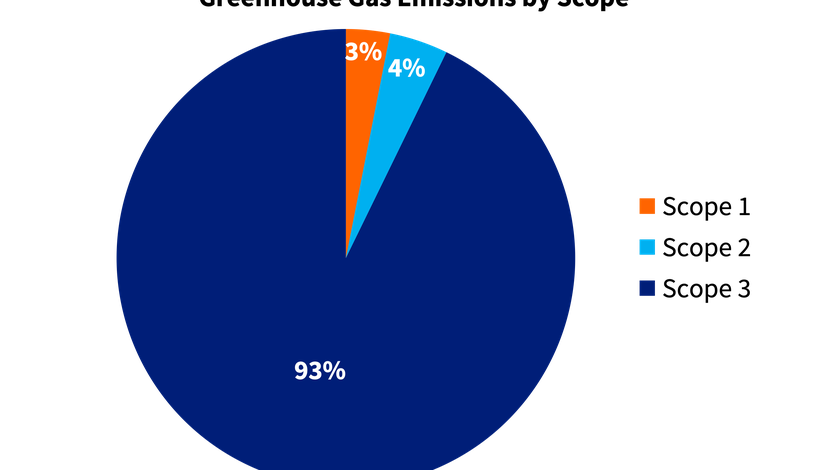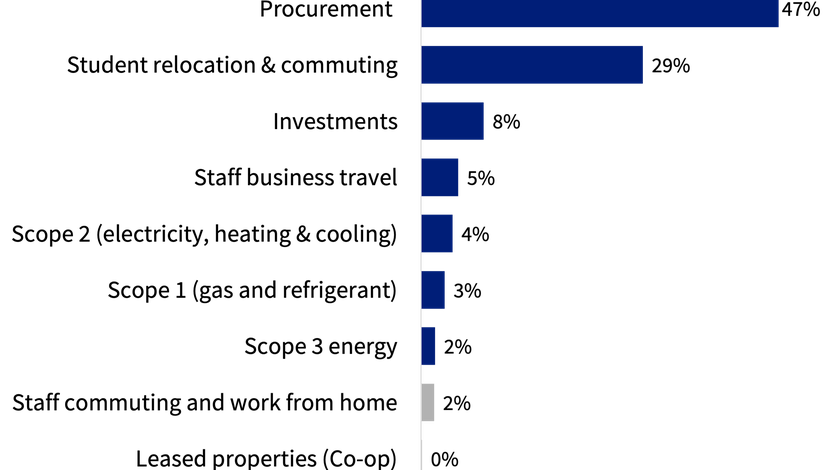Environmental Performance
Jump to
Data from the College's environmental data audit, including greenhouse gas emissions and electricity, gas, water travel and waste data.
Greenhouse gas emissions
The Royal College of Art calculates its full carbon footprint on an annual basis. This exercise was first carried out for the academic year 2022/23, which acts as our baseline for achieving net zero by 2035.
The carbon footprint was developed in line with the Greenhouse Gas Protocol and Standardise Carbon Emissions Framework. Further detail on the carbon footprint is found in the "Environmental Data" section below.
The RCA greenhouse emissions in 2023/24 were 27,545 tCO2e, which was a 1% increase from 2022/23.
A carbon footprint is split into three scopes:
Scope 1: direct energy use = 3%
Scope 2: indirect energy use = 4%
Scope 3: indirect upstream and downstream activities = 93%

Greenhouse gas emissions split by scope
Five hotspots make up 98% of emissions:
- Procurement = 47%
- Student relocation and commuting = 29%
- Energy = 9%
- Investments = 8%
- Staff business travel = 5%

Greenhouse gas emissions split by category
Improvement initiatives
The RCA is constantly seeking opportunities to improve our environmental performance and raise awareness of sustainability, as seen in our Staff & Student Engagement Strategy. Examples of improvement initiatives include:
- Data: continued monitoring of environmental data and greenhouse gas emissions
- Decarbonisation: ongoing development of RCA Decarbonisation Plan with support from the Greater London Authority’s Zero Carbon Accelerator
- Reuse: continuing Reuse Stations across campus and introducing end-of-year Swap Shops to support students to reuse and share materials.
- Food: introduced new Sustainable Food Policy in integrated sustainability in the Catering Tender.
- Waste: introduced food waste bins across all tea points.
- Energy: adopted Energy Policy and analysis of energy procurement options
- Responsible Procurement: inclusion of environmental criteria in key tenders and engagement with key suppliers on their emissions and net zero targets.
- Green space: increasing provision of space on campus for staff and students to grow food, herbs and dye plants and collaboration with local organisations to establish a dye garden off-campus.
- Supply chains: The RCA is a member of the London Universities Purchasing Consortium (LUPC), which is affiliated with Electronics Watch. Electronics Watch is an independent monitoring organisation working to achieve respect for labour rights in the global electronics industry through socially responsible public purchasing in Europe. It combines its affiliates' collective ITC purchasing power to reform public sector supply chains.

A staff-led gardening project has created containers in our Battersea campus.
Responsible investment
With the RCA's investment portfolio representing 8% of our total carbon footprint, this is a key focus area. The College's Responsible Investment Policy was introduced in 2022 and is reviewed on an annual basis. The Responsible Investment Policy sets out the approach that the College aims to follow in considering environmental, social and governance (‘ESG’) issues with regards to its investments, including our commitment to exclude investments in fossil fuel companies.
The RCA's investment portfolio is free of fossil fuel investments across all asset classes. Our external fund manager confirms the College's fossil fuel free status here (PDF).
Environmental data audit
Greenhouse gas emissions is just one environmental data point that the College measures and monitors. We audit the following areas on at least an annual basis (bi-annually for travel surveys): energy, waste, water, travel, procurement, biodiversity. See below for the detail of these audits.